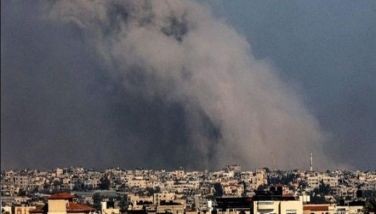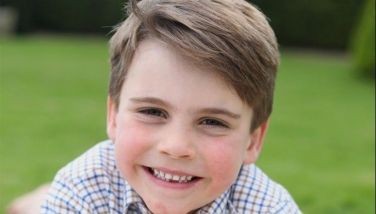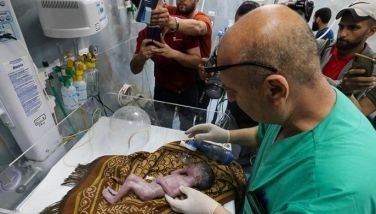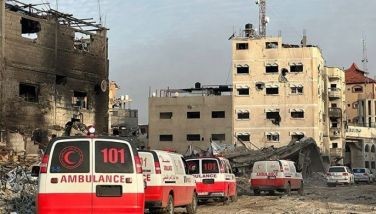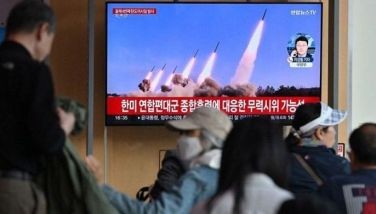'Suffering, gasping': Experts warn of oxygen shortages in poorer virus-threatened nations
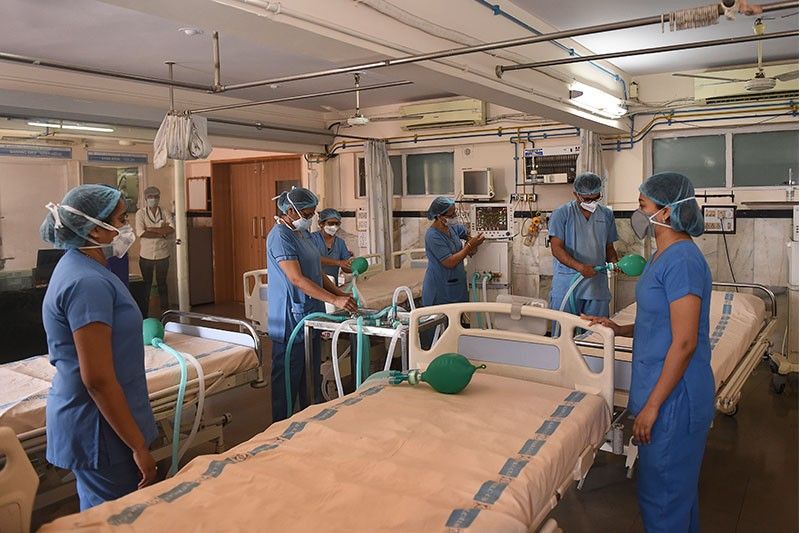
PARIS, France — As the coronavirus pandemic bears down on vulnerable nations in Africa and South Asia, experts say there are only weeks to help fill chronic shortages of what medics need to help people breathe.
Not ventilators, but oxygen itself.
Medical oxygen is a core component of the life-saving therapies hospitals are giving patients with severe cases of COVID-19, as the world waits for scientists to find vaccines and treatments.
The pandemic has pushed even the most advanced health systems to their limits, with concerns often focused on the supply of mechanical ventilators at the high-tech end of the breathing assistance spectrum.
But experts fear this has distorted the narrative about what constitutes an effective response, giving the wrong blueprint for nations with under-funded health systems.
"The reality is that oxygen is the only therapy that will save lives in Africa and Asia-Pacific now," said Hamish Graham, a consultant paediatrician and research fellow at Melbourne University Hospital and International Centre for Child Health.
"I fear that undue focus on ventilators without fixing oxygen systems will kill."
One report in February on thousands of cases in China's epidemic found that nearly 20 percent of patients with COVID-19 required oxygen. Of those, 14 percent needed some form of oxygen therapy, while a further five percent required mechanical ventilation.
In severe cases of COVID-19, the virus attacks the patient's lungs in the form of pneumonia, causing inflammation that prevents them from absorbing oxygen.
This can cause their blood oxygen levels to fall well below normal, a condition known as hypoxaemia that can deprive critical organs of oxygen and "substantially" increase the risk of death, Graham said.
"In hospitals in high-income countries, we take oxygen for granted," he told AFP.
"In low-resource settings, healthcare workers are acutely aware of the challenges as they fight to get oxygen to patients every day."
Many larger hospitals across Sub Saharan Africa and South Asia will have some oxygen cylinders in operating theatres and wards, as well as concentrators -- portable devices that filter and purify the surrounding air.
But surveys throughout Africa and Asia-Pacific have shown that less than half of hospitals have oxygen available on wards at any given time, Graham said, and even fewer have the pulse oximeters that allow medical staff to measure blood oxygen levels and guide dosages.
'Helpless'
Oxygen supply has long been a source of alarm among specialists who treat pneumonia, the world's biggest preventable infectious killer of children under five.
In Nigeria, one of the worst-affected countries, the government introduced a national policy several years ago to improve pneumonia treatment, but experts say it has not trickled down to a regional level.
Adamu Isah, who leads Save the Children's work on pneumonia in the country, said the charity recently assessed primary healthcare facilities in two states and found that oxygen supplies were "really, really concerning".
A former clinical physician, Isah said it was common to see children "suffering and gasping".
"If you don't have something like an oxygen system you find yourself helpless, there's really not much you can do," he told AFP.
A 2018 report published by Every Breath Counts, a coalition of UN agencies, businesses, donors and aid agencies, said supplies of oxygen were "severely limited" in countries across South Asia and Sub-Saharan Africa.
It cited surveys that suggested only one in 10 children with pneumonia in Nigeria received the oxygen they needed. In Ethiopia, research found that while 64 percent of hospital paediatric wards had oxygen supplies, only 14 percent had health workers trained to use them or standard operating procedures.
Leith Greenslade, the lead coordinator for Every Breath Counts, said the mining industry often has better oxygen supplies for its workers than under-funded hospitals.
"These health systems in Africa and South Asia could not be more exposed to a pandemic like this one because they haven't been investing in respiratory therapy," she told AFP.
"This is what terrifies me."
'Flying blind'
Despite pneumonia killing 800,000 children a year globally, campaigners say it has not been given the same attention as other infectious diseases like HIV, Malaria and TB.
Greenslade said global health authorities have also "completely neglected" oxygen, and this means there is very little information about supplies.
"The absence of global data on this is going to be a major problem trying to respond to COVID-19 because we are flying blind, we really don't know which countries are in more desperate need than the other," she said.
The pandemic is still largely in its early stages in Africa and parts of Asia, giving the international community "probably a two-month window" to act, she added.
While it is still unclear how the new coronavirus will spread in poorer nations, there are acute fears over densely populated cities and refugee camps.
Experts say there is no one-size-fits-all approach, urging low income countries to go beyond lockdowns and urgently scale up basic health systems.
"Like everywhere, flattening the curve is the idea, but if your health system doesn't have any intensive care beds -- or, like Malawi, has got 25 beds for 17 million people -- you can't flatten the curve to the extent that'll work," said Gwen Hines, Save the Children's executive director for global programmes.
Malawi, one of the poorest countries in Africa, has started to record cases of COVID-19, but a court last week temporarily blocked a government lockdown order.
Hines said her organisation has worked on providing solar powered concentrators to the country, which has intermittent electricity, no domestic oxygen plant, and often struggles to secure imports of medicines.
The mechanical ventilators used in well-funded health systems are the "wrong focus" for resource-poor countries, where they would have little impact, said David Lalloo, head of the Liverpool School for Tropical Medicine, which also has a large programme in Malawi.
He said the international community should instead prioritise oxygen supplies and protective equipment for health workers.
Experts fear the international community may not act fast enough, as cases rise in Africa and Asia at the same time as Europe and the United States hit their peaks.
But Graham said it was also crucial for the response to be more strategic than "buying equipment and dumping it on hospitals", urging proper staff training and maintenance.
'Solidarity and collaboration'
In Nigeria, Isah said his wish-list of equipment would start simple, with pulse oximeters, then oxygen concentrators that can be used in small healthcare settings, and finally higher-tech equipment like ventilators.
But he said a "major fear" was competition in global supply chains for even basic devices.
He called for "solidarity and collaboration" with richer nations helping those that are struggling to tackle COVID-19.
"My fear is if this COVID pandemic stays longer than a couple of months, we will face very serious problems, there will be loss of so many lives," he said.
"Countries in Europe and the US and other places, they may have the financial capacity to address the need, or they could get support easily, but in Africa we don't have those resources, even in peacetime."
Follow this page for updates on a mysterious pneumonia outbreak that has struck dozens of people in China.
New Zealand Prime Minister Chris Hipkins says on Sunday that he had contracted COVID-19, testing positive at a key point in his flailing campaign for re-election.
Hipkins saYS on his official social media feed that he would need to isolate for up to five days -- less than two weeks before his country's general election.
The leader of the centre-left Labour Party said he started to experience cold symptoms on Saturday and had cancelled most of his weekend engagements. — AFP
The World Health Organization and US health authorities say Friday they are closely monitoring a new variant of COVID-19, although the potential impact of BA.2.86 is currently unknown.
The WHO classified the new variant as one under surveillance "due to the large number (more than 30) of spike gene mutations it carries", it wrote in a bulletin about the pandemic late Thursday.
So far, the variant has only been detected in Israel, Denmark and the United States. — AFP
The World Health Organization says on Friday that the number of new COVID-19 cases reported worldwide rose by 80% in the last month, days after designating a new "variant of interest".
The WHO declared in May that Covid is no longer a global health emergency, but has warned that the virus will continue to circulate and mutate, causing occasional spikes in infections, hospitalisations and deaths.
In its weekly update, the UN agency said that nations reported nearly 1.5 million new cases from July 10 to August 6, an 80% increase compared to the previous 28 days. — AFP
The head of US intelligence says that there was no evidence that the COVID-19 virus was created in the Chinese government's Wuhan research lab.
In a declassified report, the Office of the Director of National Intelligence (ODNI) says they had no information backing recent claims that three scientists at the lab were some of the very first infected with COVID-19 and may have created the virus themselves.
Drawing on intelligence collected by various member agencies of the US intelligence community (IC), the ODNI report says some scientists at the Wuhan lab had done genetic engineering of coronaviruses similar to COVID-19. — AFP
Boris Johnson deliberately misled MPs over Covid lockdown-breaking parties in Downing Street when he was prime minister, a UK parliament committee ruled on Thursday.
The cross-party Privileges Committee said Johnson, 58, would have been suspended as an MP for 90 days for "repeated contempts (of parliament) and for seeking to undermine the parliamentary process".
But he avoided any formal sanction by his peers in the House of Commons by resigning as an MP last week.
In his resignation statement last Friday, Johnson pre-empted publication of the committee's conclusions, claiming a political stitch-up, even though the body has a majority from his own party.
He was unrepentant again on Thursday, accusing the committee of being "anti-democratic... to bring about what is intended to be the final knife-thrust in a protracted political assassination".
Calling it "beneath contempt", he said it was "for the people of this to decide who sits in parliament, not Harriet Harman", the veteran opposition Labour MP who chaired the seven-person committee. — AFP
- Latest
- Trending















